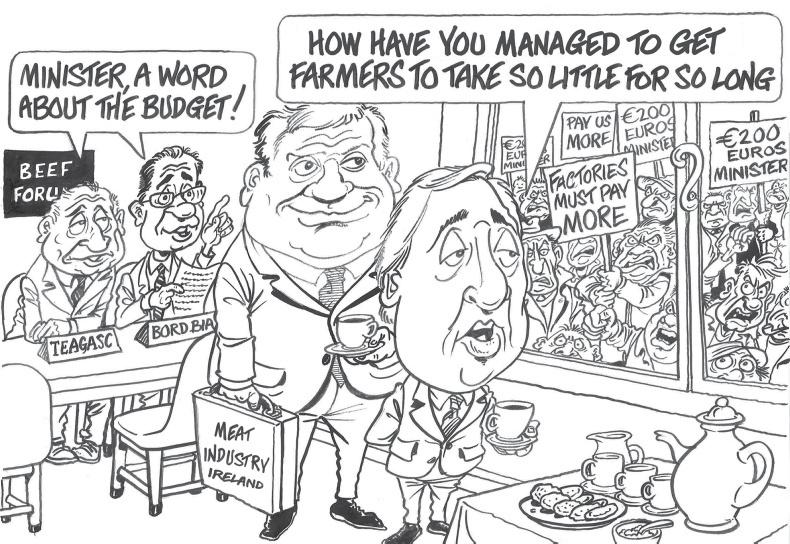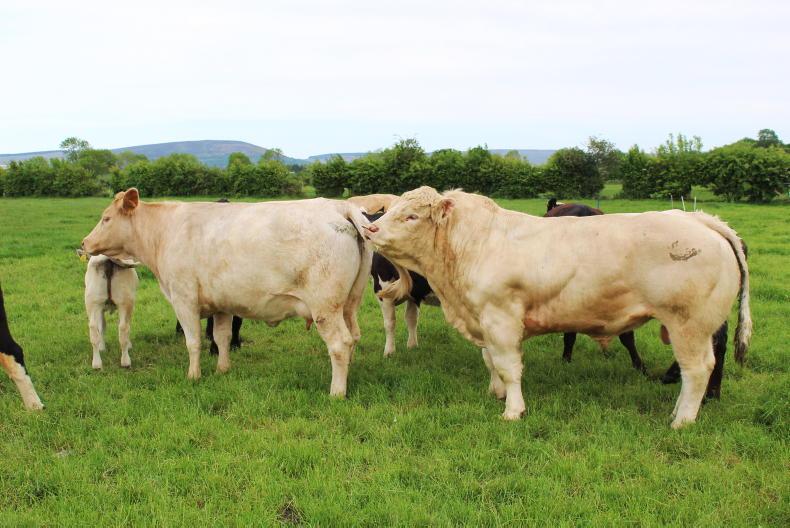On Wednesday, Minister for Agriculture Michael Creed chaired a beef forum in the absence of farmers. They were instead out on the street protesting on the same issues the forum was established to address. It is a farcical situation that reflects poorly on all those that have sat around the table over the past four years.
As chair, Minister Creed has to shoulder a significant proportion of the responsibility. He has either been unable or unwilling to implement the measures needed to improve price transparency at beef processing level. Talking around the issues rather than tackling them can only go on for so long and clearly farmers have lost patience.
As Joe Burke of Bord Bia highlighted on Monday at a large IFA suckler rally in Galway, the Irish cattle price is not only lagging behind the UK price by the equivalent of 50c/kg, it is also trending below the EU average price – which of course is based on a price paid for young bulls. Therefore, on a like-for-like basis, Irish farmers are receiving the equivalent of €180 to €200 per finished animal less than their British and EU counterparts, many of whom also receive a significant coupled payment on the suckler cow.
The effective collapse of the beef forum puts further pressure on a minister and a Government that many farmers view as not being committed to supporting the future of the suckler beef sector and indeed rural Ireland. It is a view that Minister for Communications, Energy and the Environment Denis Naughten strongly refuted when he addressed farmers in Galway on Monday night. Unlike his cabinet colleague Minister Creed, who on the same night at a farmer meeting in Co Laois played down the need for additional supports. Minister Naughten accepted that support needs to be put in place to protect the future of the sector – a view shared by European Commissioner for Agriculture Phil Hogan.
The extent to which this view is shared around the cabinet table will become clear next Tuesday when Minister for Finance Paschal Donohoe presents Budget 2019. While in its pre-budget submission the IFA has made a targeted payment of €200 per cow its number one priority, getting to this point is likely to be a journey rather than something achieved over the course of one budget.
Nevertheless, this is a budget that will shape the future of the suckler sector. Ignoring the economic challenges facing the sector will send a very clear message to farmers – confirming their suspicions that the belief around the cabinet table is that the suckler cow is seen as an economic liability in terms of climate change and should be let slowly wither away.
Alternatively, a budget that recognises the need to provide economic support to the sector will give farmers the confidence that there is recognition within Government and among the main political parties that the suckler cow is key to sustaining economic activity throughout rural towns and villages. While the reform of the CAP will be a crucial part of this journey, it will come too late if there are no commitments given in next Tuesday’s budget.
While the most intense focus will be on how the Government responds to the economic challenges facing the sector, Budget 2019 will also be assessed on the measures introduced to support the wider agri-food sector, which accounts for 10% of the national workforce, and measures to distribute the economic growth that is concentrated in the cities out across rural towns and villages.
False dawns
There have been a number of false dawns in relation to the introduction of a deposit scheme that would allow farmers better cope with income volatility. In the context of the dairy sector, the past 12 to 24 months have demonstrated the importance of such an initiative. Income volatility is often created by events over which we have no control. There is an onus on the Government to ensure the impact of these events on farm families is not compounded by poor policy design.
Meanwhile, it is disappointing that this week Minister Creed finally confirmed reports in the Irish Farmers Journal last July that the low-cost loan scheme announced as part of the 2018 budget would not be available until 2019. Given the challenges created by volatile markets and weather patterns, Government policy should be striving to deliver stability, not adding to the uncertainty.
A key decision
for tillage
The tillage sector has seen many of its chemical tools removed from the market but seldom have the stakes been as high as with the threatened loss of chlorothalonil.
This is an extremely important fungicide active. It is widely used in this country to control diseases which easily develop resistance to newer, highly specialised fungicide actives. Its loss would be a crucial blow to grain growers here.
Chlorothalonil has been in the market here for about 30 years but it may now fall victim to increasingly stringent registration rules. While it is essential that this process be based on accurate science, the loss of chlorothalonil would be most severely felt on this island, where its use has been critical to help protect other fungicide actives. Its loss from the market will threaten the lifespan of new actives yet to be registered here and a failure to control diseases such as septoria in wheat and ramularia in barley will threaten our ability to grow these crops. This will have implications for the livestock and drinks sector in particular.
Where are our leaders and politicians on this issue? This year reinforced the importance of a viable tillage sector – the retention of this active, or having something equivalent to replace it, is essential to maintain profitable cereal production. Surely it is incumbent on the powers that be to have real alternatives in place before removing crucial actives from the market.
Exceptional milk in Monaghan
The exceptional milk quality results delivered by the finalists in the NDC & Kerrygold Quality Milk Awards once again show the tremendous ability of Irish dairy farmers to produce quality protein, almost unique on a world stage.
The fact the overall winner this year is from Monaghan shows that geography plays no part in making quality product possible. The right attitude, using tried and tested principles, delivers year after year.Monaghan suppliers takes top honours in Quality Milk competition" target="_blank"> Congratulations to the McKenna family and all involved.
A capable individual in a critical role
Brendan Gleeson was announced this week as the new secretary general at the Department of Agriculture. He is a straight talker and has always displayed a deep understanding of the issues affecting farmers on the ground. His capacity has allowed him gain the widespread respect of the industry and develop an excellent reputation along the corridors of Brussels. With the challenge of Brexit and a crucial CAP reform just around the corner, the industry is fortunate to have someone with his ability in such a critical position. We wish him all the best in his new role.
Farmers will need to see
strategic plan
As Eoin Lowry and David Wright report this week, the proposed merger deal between Lakeland and LacPatrick co-ops has been finalised.
It will be put to members at a special general meeting on 23 October.
In the intervening period, a series of meetings will take place to explain the deal.
Synergies
It is important that at these meetings the respective chairmen give a vision as to how the newly formed co-op will deliver for the membership.
Efficiencies are easy to talk about but they need to be supported with a strategic plan that sets clear targets on which the delivery of management can be benchmarked – one of which has to be milk price, both north and south of the border.
On Wednesday, Minister for Agriculture Michael Creed chaired a beef forum in the absence of farmers. They were instead out on the street protesting on the same issues the forum was established to address. It is a farcical situation that reflects poorly on all those that have sat around the table over the past four years.
As chair, Minister Creed has to shoulder a significant proportion of the responsibility. He has either been unable or unwilling to implement the measures needed to improve price transparency at beef processing level. Talking around the issues rather than tackling them can only go on for so long and clearly farmers have lost patience.
As Joe Burke of Bord Bia highlighted on Monday at a large IFA suckler rally in Galway, the Irish cattle price is not only lagging behind the UK price by the equivalent of 50c/kg, it is also trending below the EU average price – which of course is based on a price paid for young bulls. Therefore, on a like-for-like basis, Irish farmers are receiving the equivalent of €180 to €200 per finished animal less than their British and EU counterparts, many of whom also receive a significant coupled payment on the suckler cow.
The effective collapse of the beef forum puts further pressure on a minister and a Government that many farmers view as not being committed to supporting the future of the suckler beef sector and indeed rural Ireland. It is a view that Minister for Communications, Energy and the Environment Denis Naughten strongly refuted when he addressed farmers in Galway on Monday night. Unlike his cabinet colleague Minister Creed, who on the same night at a farmer meeting in Co Laois played down the need for additional supports. Minister Naughten accepted that support needs to be put in place to protect the future of the sector – a view shared by European Commissioner for Agriculture Phil Hogan.
The extent to which this view is shared around the cabinet table will become clear next Tuesday when Minister for Finance Paschal Donohoe presents Budget 2019. While in its pre-budget submission the IFA has made a targeted payment of €200 per cow its number one priority, getting to this point is likely to be a journey rather than something achieved over the course of one budget.
Nevertheless, this is a budget that will shape the future of the suckler sector. Ignoring the economic challenges facing the sector will send a very clear message to farmers – confirming their suspicions that the belief around the cabinet table is that the suckler cow is seen as an economic liability in terms of climate change and should be let slowly wither away.
Alternatively, a budget that recognises the need to provide economic support to the sector will give farmers the confidence that there is recognition within Government and among the main political parties that the suckler cow is key to sustaining economic activity throughout rural towns and villages. While the reform of the CAP will be a crucial part of this journey, it will come too late if there are no commitments given in next Tuesday’s budget.
While the most intense focus will be on how the Government responds to the economic challenges facing the sector, Budget 2019 will also be assessed on the measures introduced to support the wider agri-food sector, which accounts for 10% of the national workforce, and measures to distribute the economic growth that is concentrated in the cities out across rural towns and villages.
False dawns
There have been a number of false dawns in relation to the introduction of a deposit scheme that would allow farmers better cope with income volatility. In the context of the dairy sector, the past 12 to 24 months have demonstrated the importance of such an initiative. Income volatility is often created by events over which we have no control. There is an onus on the Government to ensure the impact of these events on farm families is not compounded by poor policy design.
Meanwhile, it is disappointing that this week Minister Creed finally confirmed reports in the Irish Farmers Journal last July that the low-cost loan scheme announced as part of the 2018 budget would not be available until 2019. Given the challenges created by volatile markets and weather patterns, Government policy should be striving to deliver stability, not adding to the uncertainty.
A key decision
for tillage
The tillage sector has seen many of its chemical tools removed from the market but seldom have the stakes been as high as with the threatened loss of chlorothalonil.
This is an extremely important fungicide active. It is widely used in this country to control diseases which easily develop resistance to newer, highly specialised fungicide actives. Its loss would be a crucial blow to grain growers here.
Chlorothalonil has been in the market here for about 30 years but it may now fall victim to increasingly stringent registration rules. While it is essential that this process be based on accurate science, the loss of chlorothalonil would be most severely felt on this island, where its use has been critical to help protect other fungicide actives. Its loss from the market will threaten the lifespan of new actives yet to be registered here and a failure to control diseases such as septoria in wheat and ramularia in barley will threaten our ability to grow these crops. This will have implications for the livestock and drinks sector in particular.
Where are our leaders and politicians on this issue? This year reinforced the importance of a viable tillage sector – the retention of this active, or having something equivalent to replace it, is essential to maintain profitable cereal production. Surely it is incumbent on the powers that be to have real alternatives in place before removing crucial actives from the market.
Exceptional milk in Monaghan
The exceptional milk quality results delivered by the finalists in the NDC & Kerrygold Quality Milk Awards once again show the tremendous ability of Irish dairy farmers to produce quality protein, almost unique on a world stage.
The fact the overall winner this year is from Monaghan shows that geography plays no part in making quality product possible. The right attitude, using tried and tested principles, delivers year after year.Monaghan suppliers takes top honours in Quality Milk competition" target="_blank"> Congratulations to the McKenna family and all involved.
A capable individual in a critical role
Brendan Gleeson was announced this week as the new secretary general at the Department of Agriculture. He is a straight talker and has always displayed a deep understanding of the issues affecting farmers on the ground. His capacity has allowed him gain the widespread respect of the industry and develop an excellent reputation along the corridors of Brussels. With the challenge of Brexit and a crucial CAP reform just around the corner, the industry is fortunate to have someone with his ability in such a critical position. We wish him all the best in his new role.
Farmers will need to see
strategic plan
As Eoin Lowry and David Wright report this week, the proposed merger deal between Lakeland and LacPatrick co-ops has been finalised.
It will be put to members at a special general meeting on 23 October.
In the intervening period, a series of meetings will take place to explain the deal.
Synergies
It is important that at these meetings the respective chairmen give a vision as to how the newly formed co-op will deliver for the membership.
Efficiencies are easy to talk about but they need to be supported with a strategic plan that sets clear targets on which the delivery of management can be benchmarked – one of which has to be milk price, both north and south of the border.










SHARING OPTIONS